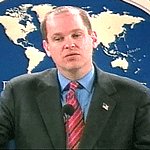2007年VOA标准英语-US Ready For Another Meeting With Iran
搜索关注在线英语听力室公众号:tingroom,领取免费英语资料大礼包。
(单词翻译)
By David GollustState Department
17 July 2007
The State Department said Tuesday U.S. diplomats1 are ready for another meeting with Iranian officials to discuss the security situation in Iraq. A May 28 meeting between the two countries' ambassadors in Baghdad was the most high-profile contact between the two countries in nearly 30 years. VOA's David Gollust reports from the State Department.
Officials are giving no date or other information about plans for a second U.S.-Iranian meeting on Iraq.
But the State Department says another meeting would be appropriate in order to reiterate2 U.S. concerns about what is seen here as destabilizing activity by Iranian in neighboring Iraq.
Iraqi Foreign Minister Hoshiyar Zebari said earlier Tuesday in Baghdad that a second round of ambassadorial-level talks of the Iraqi security situation, to follow up on the landmark3 May 28 meeting, will be held soon.
 |
| Sean McCormack |
McCormack said if it is held, the U.S. side will reiterate demands made at the at the first meeting that Iran back up its stated desire to see a peaceful Iraq with tangible5 action:
"It would be appropriate to have another face-to-face meeting to directly convey to the Iranian authorities that if they wish to see a more stable, secure, peaceful Iraq - which is what they have said they would like to see - that they need to change their behavior," McCormack said. "They need to stop supporting sectarian militias6 that are exacerbating7 sectarian tensions. They need to stop supporting EFP networks that pose a direct threat to our troops."
U.S. officials have accused Iran of supplying insurgents8 with so-called explosively-formed projectiles9 that have been used to deadly effect against American military vehicles.
The May 28 meeting, held in the office of Iraqi Prime Minister Nouri al-Maliki, brought together the U.S. ambassador in Baghdad Ryan Crocker and his Iranian counterpart Hassan Kazemi Qomi.
Both sides said the atmosphere of the meeting was good but there were no claims of substantive10 progress.
The United States and Iran have not had diplomatic relations since Iran's 1979 Islamic Revolution during which student militants11 seized the U.S. embassy in Tehran and held some 50 U.S. officials hostage for more than a year.
Despite the lack of formal ties, the two countries have had occasional contact over the years, primarily at multi-lateral meetings.
The Bush administration is limiting the Baghdad contacts to Iraq security issues. It has made an overture12 to Iran for open-ended political talks, but only if Tehran halts uranium enrichment and returns to negotiations13 over its nuclear program.
 收听单词发音
收听单词发音 




